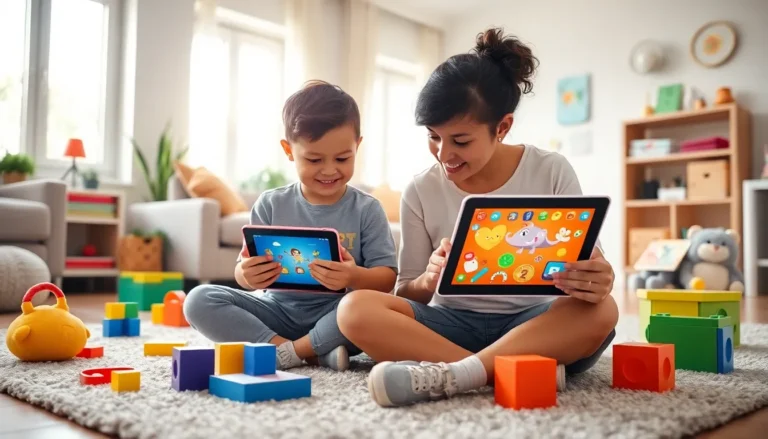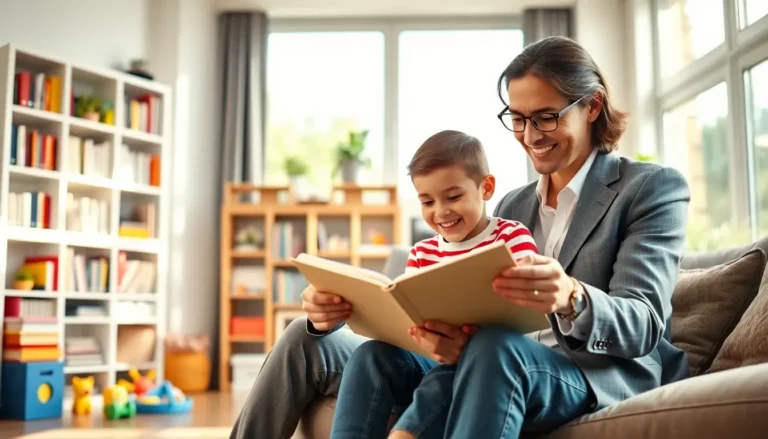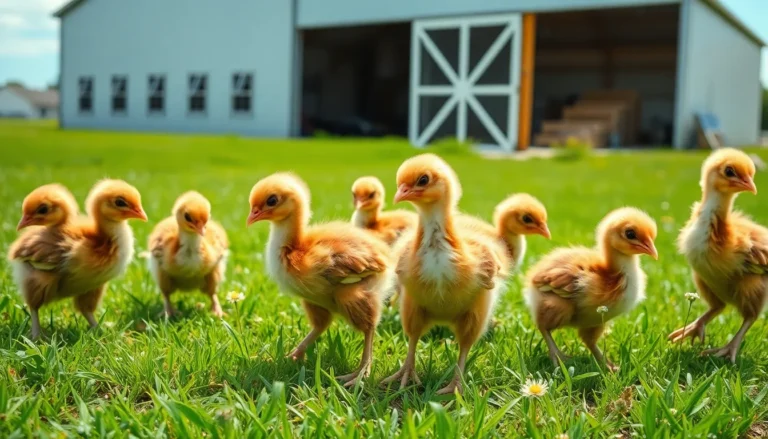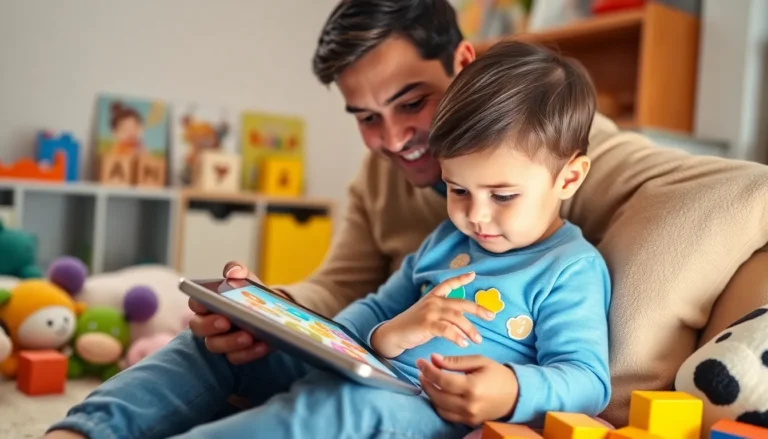In a world where screens often steal the spotlight, finding toys that educate while entertaining can feel like a treasure hunt. But fear not! The quest for the best educational toys for kids is not only rewarding but also a chance to unleash creativity and curiosity. These toys do more than just keep little hands busy—they spark imagination and build essential skills.
Table of Contents
ToggleOverview of Educational Toys
Educational toys play a crucial role in child development. They encourage imaginative play and enhance cognitive skills. Kids learn best through hands-on experiences. These toys can vary in focus, covering areas like science, math, and language.
Toys designed for education often incorporate several features. They might promote problem-solving abilities through puzzles or stimulate creativity via building sets. Engaging in play with these toys helps children develop fine motor skills. Many toys also encourage social interaction, allowing kids to collaborate and communicate.
Research supports the benefits of educational play. According to the National Association for the Education of Young Children, children who engage with educational toys exhibit greater enthusiasm for learning. This enthusiasm is essential for building a solid foundation in various subjects.
Parental involvement enhances the effectiveness of educational toys. Parents can guide playtime, asking open-ended questions to spark curiosity and deepen understanding. The right educational toys not only captivate children’s attention but also align with their developmental needs.
Selecting quality educational toys requires attention to age appropriateness and skill development. Various brands offer options tailored to different age groups, ensuring that kids receive toys that match their maturity levels. By prioritizing educational value, parents can provide children with resources that educate while they play.
Importance of Educational Toys
Educational toys hold significant value in a child’s development. They promote creativity, encourage curiosity, and support the acquisition of essential skills.
Cognitive Development
Cognitive skills flourish through interactive experiences with educational toys. These toys challenge children to solve problems, think critically, and engage in scientific exploration. Research shows that when kids interact with toys focusing on math, science, and language, they develop better reasoning abilities. For example, puzzles enhance spatial awareness. Additionally, building sets foster logical thinking. Engaging with such toys systematically builds neural connections, laying a foundation for academic success.
Social Skills Enhancement
Social skills receive a boost when children play with educational toys together. Group play encourages communication and collaboration, helping kids learn to share and take turns. Games that require teamwork or strategy cultivate leadership and negotiation skills. As children work through challenges together, they develop empathy and emotional intelligence. These experiences teach conflict resolution, which is crucial for personal development. Thus, educational toys not only entertain but also build essential social competencies.
Top Categories of Educational Toys
Various categories of educational toys help children develop essential skills while having fun. These toys target specific learning areas, ensuring kids receive a well-rounded educational experience.
STEM Toys
STEM toys promote learning in science, technology, engineering, and mathematics. Building sets enhance problem-solving abilities and critical thinking skills. Robotics kits encourage logical reasoning while fostering creativity. Additionally, science experiments can ignite curiosity about the natural world. These toys often incorporate hands-on activities that engage children actively, making complex subjects enjoyable.
Creative Play Toys
Creative play toys stimulate imagination and artistic expression. Art supplies, like paints and markers, encourage children to explore their creativity. Play-dough kits promote fine motor skill development while allowing artistic freedom. Puppet theaters inspire storytelling and role-playing, enhancing communication skills. These toys provide an outlet for self-expression and help develop emotional intelligence through imaginative play.
Language and Literacy Toys
Language and literacy toys support reading and language development. Alphabet puzzles introduce children to letters and sounds, boosting early literacy skills. Interactive storybooks engage kids with captivating narratives, enhancing comprehension. Flashcards promote vocabulary building and word recognition, while word games make learning fun. These toys create a solid foundation for language skills and a lifelong love of reading.
Best Educational Toys for Different Age Groups
Selecting educational toys tailored to various age groups maximizes their developmental impact. These toys should nurture growth while sparking excitement.
Infants and Toddlers
Infants and toddlers benefit from sensory toys that stimulate touch, sound, and sight. Plush toys with varied textures engage fine motor skills, while toy blocks promote hand-eye coordination. Musical toys introduce rhythm and language, fostering auditory skills. For example, rattles support early motor skills and auditory recognition. Shape sorters, on the other hand, encourage problem-solving abilities. Each of these toys plays a crucial role in developing foundational skills for this age group.
Preschoolers
Preschoolers thrive on toys that encourage imaginative play and creativity. Art supplies, such as crayons and finger paints, help in developing fine motor skills while allowing self-expression. Building sets inspire spatial awareness and critical thinking through hands-on construction. Games that involve numbers or letters introduce basic math and literacy concepts. Storybooks also foster a love for reading, laying the groundwork for lifelong learning. Engaging with these educational toys cultivates curiosity and enhances social skills through shared play experiences.
School-Age Kids
School-age kids benefit from toys that challenge cognitive skills and promote teamwork. STEM kits introduce concepts in science and math, using hands-on experiments to deepen understanding. Board games enhance strategic thinking and promote cooperation among peers. Craft kits, filled with various materials, encourage creativity while fostering project management skills. Reading materials that align with their interests engage them further and boost literacy development. Each type of toy caters to essential skills that support academic success and personal growth.
Safety and Quality Considerations
Safety and quality play critical roles in selecting educational toys for children. Toys should be non-toxic and free of small parts that pose choking hazards, especially for younger children. Manufacturers must adhere to safety standards like ASTM or EN71 to ensure compliance with regulations.
Parents often check for age recommendations on packaging. These indications help determine whether a toy is suitable for a child’s developmental stage. Selecting age-appropriate toys minimizes risks while maximizing educational value.
Quality materials contribute significantly to a toy’s longevity and safety. Durable plastics or sustainably sourced wood increase the lifespan of toys, making them a worthwhile investment. Well-constructed toys also withstand rough handling during play, encouraging children to explore freely.
Certifications from organizations such as the American Toy Association provide additional assurance regarding safety and quality standards. Noting these certifications can aid parents in making informed decisions.
Regularly inspecting toys for wear and tear is essential. Parents should ensure that toys remain in good condition to prevent injuries. Discarding damaged toys helps maintain a safe play environment.
Choosing toys that encourage open-ended play often enhances educational benefits. Open-ended toys stimulate creativity and critical thinking while minimizing the likelihood of frustrating experiences related to quick disassembly or unclear usage.
Focusing on safety and quality ensures that children benefit from their educational toys without compromising their well-being. Implementing these considerations enables parents to make thoughtful choices that support their child’s development and play experience.
Choosing the right educational toys can significantly impact a child’s development. These toys not only entertain but also nurture essential skills that lay the groundwork for lifelong learning. By fostering creativity problem-solving and social interaction educational toys create a rich environment for growth.
Parents play a vital role in this journey by selecting age-appropriate toys and engaging in playtime. This involvement enhances the educational experience and encourages curiosity. Prioritizing safety and quality ensures kids can explore and learn without risk.
Ultimately investing in educational toys is an investment in a child’s future. The right toys can inspire a love for learning and help children thrive both academically and personally.








